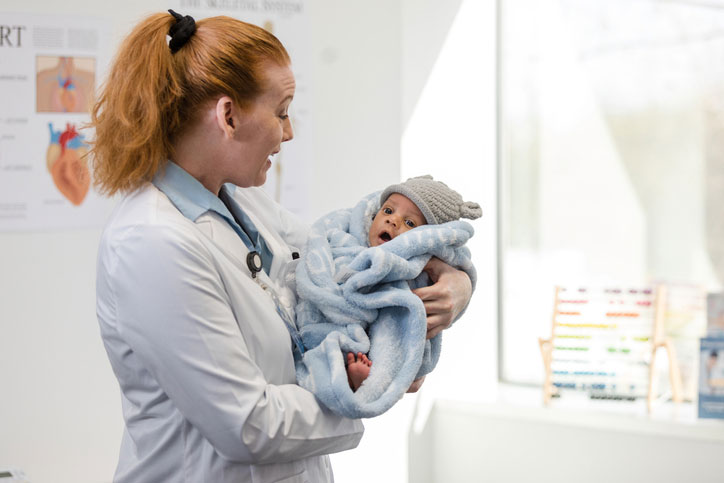Written by Allison Feldman

Role of Neonatal Nurse Practitioners (NNPs)
Neonatal Nurse Practitioners (NNPs) are nurses who provide advanced medical support to preterm and full term infants through the first years of their lives. NNPs play a crucial role in the healthcare system, particularly in neonatal intensive care units (NICUs). This fast-growing field is a great opportunity to advance in the healthcare job market — particularly in California, the state with the highest paid nurse practitioners in the country.
Nurses who follow the NNP Doctor of Nursing Practice (DNP) pathway are well-rounded. NNP DNPs provide comprehensive care to newborns, particularly those who are critically ill or premature. Their responsibilities in NICUs include conducting physical assessments, diagnosing and managing common neonatal conditions, and performing procedures such as intubation and resuscitation. NNPs handle both stable and unstable infants, providing care that is critical for their survival. NNPs often attend high-risk births to immediately begin life-saving measures to vulnerable or ill infants once the infant is born.
NNP DNP programs in California create advanced practice nurses who are capable of not only life-saving medical measures, but are also involved in the leadership of interdisciplinary teams in the NICUs.
NNPs work with the other neonatologists, nurses, respiratory therapists, social workers, physician assistants, geneticists, and pharmacists in the NICU to provide healthcare while also providing the family’s support, education, and advocacy. Highly skilled and passionate NNPs that graduate from Neonatal Nurse Practitioner schools in California are crucial to infant survival rates. Although infant survival rates are much higher than they were just fifteen years ago, the demand for excellent NNPs will only go up in the next decade.
By providing specialized care, timely interventions, and close monitoring, NNPs help manage complex conditions that can pose life-threatening risks to newborns. DNPs who train at Neonatal Nurse Practitioner schools in California learn to respond rapidly to emergencies, reducing the chances of complications in vulnerable infants.
Education and Certification Requirements
NNPs are highly educated, with strict regulations for practice. To become certified as an NNP, candidates must possess a Master’s of Science in Nursing (MSN). However, the trend in California is moving toward a preference for a Doctorate of Nursing Practice (DNP) degree as the new standard for NNPs. This shift reflects the increasing complexity of neonatal care and the need for advanced clinical and leadership skills.
Admission to DNP-NNP programs in California typically requires:
- A Bachelor’s of Science in Nursing (BSN) or an MSN
- An active Registered Nurse (RN) license
- A minimum number of clinical practice hours as an RN (one to two years full-time, with a concentration on the care of neonates and infants)
- Depending on the program, applicants may also need to submit GRE scores, letters of recommendation, and a personal statement.
DNP NNP programs in California generally require 2 – 4 years of study and around 36-73 credits, depending on if students have an MSN prior to beginning the program and if they enroll full-time or part-time. The curriculums for DNP NNP programs in California include core courses in advanced practice nursing, leadership, and healthcare policy, along with specialty courses focusing on neonatal care. These may cover topics such as maternal risk and neonatal health, management of the sick neonate, and neonatal diseases.
Clinical Experience

Clinical experience is a vital component of DNP NNP programs in California. Neonatal nurse practitioners in California are required to complete a significant number of clinical hours—typically ranging from 600 to 1000 hours—focusing specifically on neonatal care. This hands-on training is crucial for developing the skills necessary to manage complex cases in the NICU effectively.
Once a student graduates from a DNP NNP program, she or he is eligible to take the National Certification Corporation’s Neonatal Nurse Practitioner Certification exam (or the Neonatal Nurse Practitioner Core Board Certification. If passed, this exam licenses the student to become a NNP.
Practice Autonomy and Regulations
Only 22 states have granted full practice authority to DNPs — currently, California still restricts the autonomy of DNPs. Rural states in particular have leaned into offering more independence to DNPs. Alaska, New Hampshire, Oregon, and Washington were the first states to offer full practice autonomy to DNPs. However, with the increasing need of skilled medical care across the country, more states are following suit.
Historically, guidelines for practice autonomy for DNPs in California have been strict, limiting the independence of DNPs provides for a transition-to-practice period for qualified DNPs to practice independently in California without the direct oversight of a physician.
While this will give NPP DNPs more autonomy, it is important to note the collaborative nature of the NICU — where surgeons, pediatricians, and nurses all work together to get infants out of intensive care. The autonomy for DNPs will allow these neonatal nurse practitioners to diagnose and treat patients in conjunction with other medical professionals.
Salary Expectations
The average salary for NNPs in California hovers between $140,000 to $170,000, with the median around $160,000, which makes California the highest paying state for nurse practitioners in the country.
The high demand for nurses with advanced degrees in California is good news for aspiring DNPs. For those who are interested in NNP DNP programs in California, your salary can be even higher due to the advanced specification of neonatal nursing practice.
Those holding a DNP often command higher salaries compared to their colleagues with only an MSN. Additionally, practice settings can impact earnings; for example, NNPs working in major metropolitan hospitals may earn more than those in smaller community facilities. Specialization within neonatal care can further enhance salary prospects, with NNPs who take on leadership roles or pursue additional certifications typically earning higher wages.
Why Choose to Become a NNP in California?
The NNP DNP path is an excellent choice. Not only is there plenty of demand for NNP DNP jobs in California, but the NNP DNP average salary in California is high.
The rising demand for Neonatal Nurse Practitioners in California is driven by the difficulty of neonatal care and the need for nurses with advanced training, particularly in rural areas. As the healthcare landscape evolves, the role of NNPs will become even more critical in improving outcomes for fragile infants. The push for DNP programs as the standard for NNP education highlights the importance of preparing these advanced practice nurses for the challenges ahead.
As states continue to prioritize quality healthcare and positive health outcomes, NNPs will play a pivotal role in shaping the future of neonatal care in California. With their specialized knowledge and clinical expertise, NNPs can positively impact the health and well-being of the most vulnerable patients.
2023 US Bureau of Labor Statistics salary and employment figures reflect state data, not school-specific information. Conditions in your area may vary. Data accessed September 2024.
